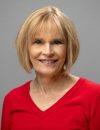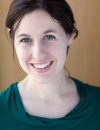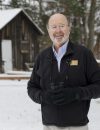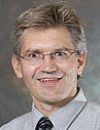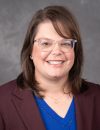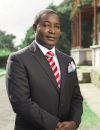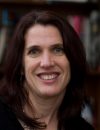Sierrena Taylor-Seals expected to take out thousands of dollars in student loans to earn her education degree from UW-Madison.
UW In The News
-
‘He Stiffed Our Party’: Bloomberg Doubts Resurface Before D.N.C. Speech
“After spending a billion dollars on his own candidacy in the primary, many in the party thought that would imply spending at least as much on the general election, if not more,” said Eleanor Neff Powell, an associate professor at the University of Wisconsin-Madison with a focus on money in politics. “A billion dollars may be an unreasonable expectation, but he set — and in some ways expanded — those expectations during the primary, even if he didn’t outright say how much he planned to spend in the general.”
-
How Birds Respond to Extreme Weather
“For the first time, we can look at how species responded immediately following extreme weather conditions over the scale of an entire continent,” said Jeremy Cohen, who led the research as a postdoctoral researcher at the University of Wisconsin-Madison.
-
Opinion: There is a safe, healthy path forward from the ravages of the coronavirus
Written by Robert N. Golden, MD, is dean of the University of Wisconsin School of Medicine and Public Health. Joseph E. Kerschner, MD is dean of the Medical College of Wisconsin School of Medicine.
-
UW-Madison unveils loan forgiveness program to keep teachers in Wisconsin
-
Storm Isaias’s Most Damaging Winds Were on Its Right
“If a storm is moving northwards at 10 miles per hour, and the wind’s rotational speed is 90 miles per hour, then to the east, the wind speed will be 100 miles per hour, and to the west, it will be 80 miles per hour,” said Steve Ackerman, director of the Cooperative Institute for Meteorological Satellite Studies at the University of Wisconsin in Madison.
-
What is used to treat covid-19? Not even doctors are sure.
For most of April, Marylu Seidel felt like she was starring in a science fiction movie. Her husband of 34 years, Jeff, was sedated in an intensive care unit more than an hour’s drive away in Madison, Wis., and her only window into his world was a daily phone call with his nurses. His doctors, first at a local community hospital and then at the University of Wisconsin Hospital and Clinics, tried everything to help Jeff defeat the novel coronavirus — a ventilator, an antibiotic, an antimalarial drug, blood thinners, a blood plasma transfusion.
-
The Recession Is About to Slam Cities. Not Just the Blue-State Ones.
The estimates, to be published in the National Tax Journal by Mr. Chernick, David Copeland at Georgia State University and Andrew Reschovsky at the University of Wisconsin, are based on the mix of local revenue sources, the importance of state aid and the composition of jobs and wages in each city. The researchers predict average revenue shortfalls in the 2021 fiscal year of about 5.5 percent in a less severe scenario, or 9 percent in a more severe one.
-
How to make sure your ballot is counted this fall
“If a requested ballot doesn’t arrive in the voter’s mailbox, or the voter ‘spoils’ the ballot by making a mistake, then voting in person on Election Day is a fail-safe,” said Barry C. Burden, director of the Elections Research Center at the University of Wisconsin-Madison.
-
Controversial killing of wolves continues in Washington State
Many of those opposed to the state’s actions point to recent research suggesting non-lethal methods, such as guardian dog teams and protected livestock enclosures, which tend to be more successful at preventing future attacks than simply killing predators, says University of Wisconsin-Madison biologist, Adrian Treves. Such killings can actually lead to more livestock losses because it disrupts the pack’s social networks, leading surviving wolves to turn easier prey such as domestic animals, says Treves, who founded Carnivore Coexistence Lab, which conducts research worldwide on conflict between predators and livestock.
-
UW-Madison researchers working on a faster, simpler COVID-19 test that uses spit, not swabs
In a shaded parking lot on the University of Wisconsin-Madison campus, so-called spit concierges guide volunteers though giving a saliva sample. On the other side of the parking lot is a pared-down biology lab where scientists test the spit-filled plastic vials for the virus that causes COVID-19.
They’ll have the results within one or two hours.
-
Senator Tammy Baldwin, former Israel Prime Minister Golda Meir among influential women on Wisconsin list
Noted: Vel Phillips was a civil rights activist who smashed racial and gender barriers as the first Black woman to graduate from the University of Wisconsin law school, the first woman to be elected to Milwaukee Common Council, the first appointed female judge in Milwaukee County and the first Black person ever elected to statewide office in Wisconsin.
Born in Keshena, Wisconsin, in 1935, Ada Deer grew up in a log cabin on a Menominee Indian Reservation. She was the first Menominee to earn an undergraduate degree at the University of Wisconsin and the first Native American to receive a master’s in social work from Columbia University. Deer also was the first woman to chair the Menominee Tribe in Wisconsin.
-
Coronavirus has upended school plans. It will also worsen racial and economic inequalities, experts warn
With coronavirus cases still high around the country, half of U.S. elementary and high school students will attend school only virtually this fall, according to a study by Burbio, which aggregates school and community information nationwide.
That will have grave implications for minority and disadvantaged students, said Madeline Hafner, executive director of the Minority Student Achievement Network Consortium at the Wisconsin Center for Education Research.
The past five or six months have “really brought to light these racial disparities that have persisted for generations,” she said.
“With great uncertainty about the new school year, wealthier, predominantly White parents are using their resources to secure educational options for their individual children,” Erica Turner, an associate professor at the University of Wisconsin-Madison, wrote in her “Equity in Pandemic Schooling” action guide.
-
Is In-Person Voting Really Unsafe?
“We were lucky in April here, I don’t know if we would be that lucky again,” said Malia Jones, an associate scientist in health geography for the applied population laboratory at the University of Wisconsin-Madison. In early April, there was “very little disease circulating,” in the state, Jones said, noting that voting by mail “is clearly the safer option.”
-
How Suffering Farmers May Determine Trump’s Fate
Katherine Cramer, a political scientist at the University of Wisconsin-Madison, spent eight years interviewing rural Wisconsinites for her book “The Politics of Resentment,” published months before Trump’s election. “I heard so many complaints about teachers,” she told me. “ ‘How is it that they can get off of work? People who really work hard don’t have time to go out and protest.’ ”
-
NOAA hurricane forecast now predicts ‘extremely active’ season
The study, by a group of researchers at NOAA and the University of Wisconsin at Madison, builds on previous research that found a trend, though not a statistically robust one, toward stronger tropical cyclones
-
How To Advocate For Diversity In Your Kid’s Curriculum At School
Case in point: In 2018, data compiled by librarians at the University of Wisconsin-Madison School of Education’s Cooperative Children’s Book Center (CCBC) showed that while over half of children’s books feature white main characters, only 10% depict Black characters. “There are more children’s books about talking animals and trucks than there are about all other racial/ethnic groups combined,” says Parrott. “That is appalling.”
-
The Goonies, Museum Rejects
I think of the frictions in my life, too. Legos underfoot. Track changes. Heavy books. Grading. Laundry. Emails. Cardio. Recycling. Which frictions are about privilege, and which help me move in the world with weight and worry, using that friction to open the jar, to pay attention, to feel the potential in the things around me?
Sarah Anne Carter runs the Center for Design and Material Culture at UW-Madison. She writes about museums and making sense of the world.
-
Sinclair yanked a pandemic conspiracy theory program. But it has stayed in line with Trump on coronavirus.
The pattern has suggested that the company, controlled by the heirs of founder Julian Sinclair Smith, has harnessed its station group as a political vehicle. “Their purpose seems to be to [promote] Donald Trump and far-right opinion,” said Lewis Friedland, a journalism professor at the University of Wisconsin.
-
Silicon Valley is losing the battle against election misinformation
Researcher Young Mie Kim was scrolling through Instagram in September when she came across a strangely familiar pattern of partisan posts across dozens of social media accounts.
Kim, a professor at the University of Wisconsin-Madison specializing in political communication on social media, noticed a number of the seemingly unrelated accounts using tactics favored by the Russia-linked Internet Research Agency, a group that U.S. national security agencies say carried out a multiyear misinformation effort aimed at disrupting the 2016 election — in part by stoking existing partisan hatred.
-
Hand sanitizer poison calls grow along with FDA toxic list
“We’re being much more vigilant about sanitization and as a result, there’s a lot more of these supplies for people or kids to get into inadvertently. We’ve had some very bad advice from out national leadership. There are people who are doing things that may have been said in jest that they don’t realize, because of who it’s coming from,” says Ed Elder, director of the Zeeh Pharmaceutical Experiment Station at the University of Wisconsin-Madison.
-
Covid-19 Testing Is in Short Supply. Should You Still Get a Test?
Yes, said R. Alta Charo, a professor of law and bioethics at the University of Wisconsin-Madison.
“One of the most important things to keep in mind when discussing public health is the fact that this is fundamentally a community issue, not merely an individual health concern,” she said. “We are all in this together. What I do affects everyone around me, and what they do affects me.”
-
Why the pandemic is testing confidence in the US currency
But this is not the first time in recent years that the dollar’s dominance has been questioned. In 2008, an academic study by Mr Frankel and Menzie Chinn, a professor at University of Wisconsin – Madison, predicted that by 2022 the euro would surpass the dollar as the world’s leading reserve currency.
-
Covid-19 Tests Are in Short Supply. Should You Still Get One?
Yes, said R. Alta Charo, a professor of law and bioethics at the University of Wisconsin-Madison.“
One of the most important things to keep in mind when discussing public health is the fact that this is fundamentally a community issue, not merely an individual health concern,” she said. “We are all in this together. What I do affects everyone around me, and what they do affects me.”
-
FDA Nears Decision Authorizing Covid-19 Treatment With Convalescent Plasma
William Hartman, a doctor at the University of Wisconsin, Madison, who is treating hospitalized Covid-19 patients with convalescent plasma, said FDA emergency-use authorization may prompt more hospitals to give the treatment earlier.
-
Covid-19 vaccine: High-risk populations, health-care, essential workers should have priority, experts say
One committee member, Paul Hunter, an associate professor of family medicine at the University of Wisconsin School of Medicine and Public Health, offered this summary: “If I was looking at the data correctly, if you’re a middle-aged-to-older African American female medical assistant with diabetes and hypertension, it looks to me like you’re on top of the list to get the vaccine.”
-
What It Will Take to Reopen Schools Safely
It will take coordinated effort from national, state, and local leadership, individual behavior change, and funding to bring the outbreak under control and to return to in-person schooling safely. Measuring exactly 6 feet in between desks will not be enough to achieve these aims; we need to think about the big picture and consider how each reopening plan stacks up against these goals.
BY SANDRA ALBRECHT, MALIA JONES, APARNA KUMAR, LINDSEY LEININGER
-
UW System receives $2 million gift for online education as fall planning continues
The University of Wisconsin System announced a $2 million anonymous donation Monday that will help improve online classes and academic advising.
-
Vulnerability Is Strength: Updating The Language Of Leadership
“Data is (sic) suggesting that we may want to revisit the idea of projecting an image. Research shows that onlookers subconsciously register lack of authenticity. Just by looking at someone, we download large amounts of information others. We are programmed to observe each other’s states so we can more appropriately interact, empathize, or assert our boundaries, whatever the situation may require,” says Paula Niedenthal, Professor of Psychology at the University of Wisconsin-Madison. We are wired to read each others’ expressions in a very nuanced way. This process is called “resonance” and it is so automatic and rapid that it often happens below our awareness.”
-
Covid-19 Airport Testing: US To Europe, Here’s What To Expect
So this means some travelers will slip through the net. Skipping quarantine yet out in the community. Even if rapid (less accurate) tests miss some infected people, they can still have a significant impact on transmission says Dave O’Connor, a professor of pathology and laboratory medicine at the University of Wisconsin-Madison.
-
Cotton, Folded, Ventilated — What Kind Of Mask Is Best?
Noted: Research by Scott Sanders, a professor in the mechanical engineering and electrical and computer engineering departments at the University of Wisconsin-Madison, has shown that in situations where people can social distance, three-layered masks are best, with cotton for the internal layer, a non-woven synthetic for the middle and an outer layer of polyester.
But even if there is leaking from the mask, some kind of barrier is better than nothing, said Ajay Sethi, an associate professor of population health sciences at UW-Madison.
And, the masks should really be combined with social distancing, added Sethi, who is part of a team developing a model to forecast potential surges in hospitalizations in southern Wisconsin.
- Newer stories
- Page 54 of 140
- Older stories
Featured Experts
Kathleen Glass: Food safety
Food is an integral part of Thanksgiving. And who doesn't love leftovers? But after how long should you leave those… More
Cecelia Klingele: Body-worn cameras by police
Madison Police Chief Shon Barnes is requesting that the city fund widespread use of body cameras for officers in the… More
Stanley Temple: Fall phenology
The days have finally started getting cooler and we all know winter awaits. Stanley Temple, an expert on birds, wildlife, endangered… More
Jonathan Temte: The seasonal flu shot
Family medicine professor Jonathan Temte is available to discuss this year's updated seasonal flu shot and flu prevention and control. More
Noelle LoConte: Pancreatic Cancer Awareness Month
Pancreatic cancer is one of the most difficult cancers to prevent, diagnose or treat. Earlier this month, music legend Quincy… More
Alvin Thomas: Movember and Men's Health Month
You might see more facial hair this month as Movember goes into full effect, drawing awareness toward men's health. Alvin… More
Dominique Brossard: Vaccine hesitancy
With a new administration poised to take power in January, a change in policy regarding vaccines may also be on the way.… More

